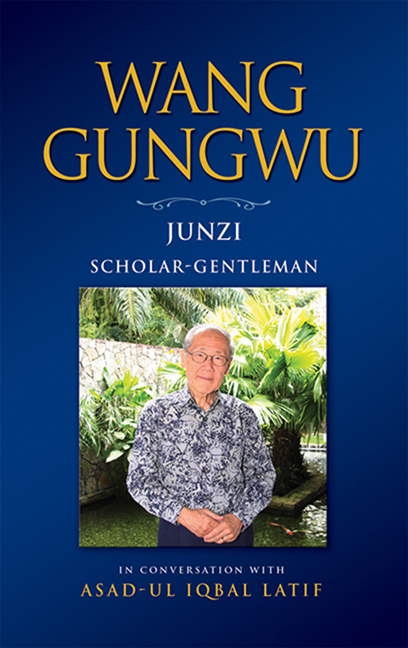Book contents
- Frontmatter
- Contents
- Foreword
- Wang Gungwu: Friend, Mentor and Role Model
- Junzi: Scholar-Gentleman
- INTERVIEWS WITH PROFESSOR WANG GUNGWU
- Being Chinese in Malaya
- Malaysia, Singapore and Australia
- Vietnam
- Hong Kong
- China Rising
- Taiwan, Japan and India
- The United States, Terrorism and War
- Half a Century of Marriage: An Interview with Mrs Margaret Wang
- Appendices
- Index
- Plate Section
Vietnam
from INTERVIEWS WITH PROFESSOR WANG GUNGWU
Published online by Cambridge University Press: 09 November 2017
- Frontmatter
- Contents
- Foreword
- Wang Gungwu: Friend, Mentor and Role Model
- Junzi: Scholar-Gentleman
- INTERVIEWS WITH PROFESSOR WANG GUNGWU
- Being Chinese in Malaya
- Malaysia, Singapore and Australia
- Vietnam
- Hong Kong
- China Rising
- Taiwan, Japan and India
- The United States, Terrorism and War
- Half a Century of Marriage: An Interview with Mrs Margaret Wang
- Appendices
- Index
- Plate Section
Summary
What did the First and Second Indochina Wars mean to you in your formative years?
The end of World War II was an exciting time for all young people in Asia. At school, we were increasingly conscious that nationalist anti-colonial sentiments were growing around us and that the British were under pressure to pull back from their empire and return home. We also saw that the Dutch in their East Indies and the French in Indochina faced the same problems. I did not pay much attention to the war in Indochina at the beginning. Apart from the tensions building up in Malaya between the British Military Administration and the various activist groups organized by the Malayan Communist Party, what was more directly relevant to us was the war for Indonesian independence, especially where it concerned the Malay states on the other side of the Malacca Straits. But we were also interested in what was happening in India and Burma where the British were clearly unable to assert the kind of control they had wielded before the Pacific War had begun. I saw the French forces, clearly weaker than the British, fighting a losing battle to do the same thing, and did not think much of the efforts they made to shore up their positions in the three states of Vietnam, Cambodia and Laos. I simply assumed that they would have to leave sooner or later, and soonest from Vietnam where the nationalist forces were strongest.
In any case, I went to China in 1947 and, for more than a year, Southeast Asia was largely out of sight and out of mind. The civil war in China dominated our lives when we were not actually studying. I can only recall two strong impressions of other parts of Asia during my year and a half in Nanjing. The first was the independence of India followed by the assassination of Gandhi, on which subject the Chinese newspapers reported in great detail.
- Type
- Chapter
- Information
- Wang GungwuJunzi: Scholar-Gentleman in Conversation with Asad-ul Iqbal Latif, pp. 50 - 59Publisher: ISEAS–Yusof Ishak InstitutePrint publication year: 2010



